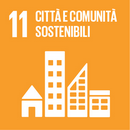Sustainable Safety and Resilience of Buildings – Prof. Rui Pinho, Dott.ssa Martina Caruso
- 01, 18, 2023
The course will focus on SDG11 “Sustainable and resilient reuse of existing buildings” and will be structured in the perspective of multi-level, multi-disciplinary, integrated approach.
Title: Sustainable safety and resilience of buildings
Provider: University of Pavia, Prof. Rui Pinho, Dott.ssa Martina Caruso
Date: second semester
Description of the course:
The 11th sustainable development goal of the 2030 Agenda is ‘to make cities and human settlements inclusive, safe, resilient and sustainable’. To date, sustainability targets applied to the built environment have mainly focused on trying to limit buildings carbon footprint, e.g. by reducing operational energy consumption, limiting waste generation, decarbonising the power supply, and addressing embodied carbon stored in construction materials, amongst others. Recently, however, the concept of sustainability has been broadened, to include also safety and resilience against natural hazards, such as e.g. earthquakes, which stand out as events that can produce extensive damage to buildings. Sustainable objectives now include thus also the minimisation of earthquake-induced economic and environmental impacts, as well as the increase of life safety (i.e. reduction of expected life losses, injuries, and homelessness).
This course will provide basic knowledge about seismic risk, with highlights on the influence that the latter may have on buildings’ environmental performance, due to earthquake-induced damage and consequent repair and retrofitting activities. Strategies and approaches to buildings retrofitting will also thus be discussed, within the context of this new concept of sustainability.
The course program overall is hence aimed at improving awareness of seismic risk and life protection, and at broadening students’ perspective towards multi-disciplinary and integrated approaches aimed at sustainability. Six modules are proposed:
- Physical impact of earthquakes on buildings and infrastructure (2 hours)
- Environmental impact of earthquakes (2 hours)
- Economic and social impact of earthquakes (2 hours)
- Sustainable strategies to reduce seismic risk and increase life safety (2 hours)
- Sustainable approaches to increase building resilience (2 hours)
- Demonstrative examples of sustainable seismic retrofitting of buildings (2 hours)
Learning outcomes:
- Link between seismic risk prevention and sustainable development strategies
- Increased awareness of seismic risk
- Sustainable approaches to human life safety against natural hazards
How: in streaming on line
Credits: 2 CFU (12 hours)
Time period: March-April 2023. Each class will be held at 4h00-6h00 PM.
Thursday, March 15
Wednesday, March 21
Tuesday, March 28
Monday, April 3
Friday, April 14
Thursday, April 20
Any prerequisites: Interest on sustainability of built environment.
Learning resources: Slides, videos and scientific literature, available on the course Kiro web page, here.
Type of assessment: Multiple-choice questionnaire through ESSE3/KIRO platforms
Quality assurance: University of Pavia.
Outcome: Open Badge.
Integration / stackability This micro-credential course could include or be spread throughout partners of our EC2U project, as the activities of the Virtual Institute established in the WP6 framework deals with strongly related topics.

